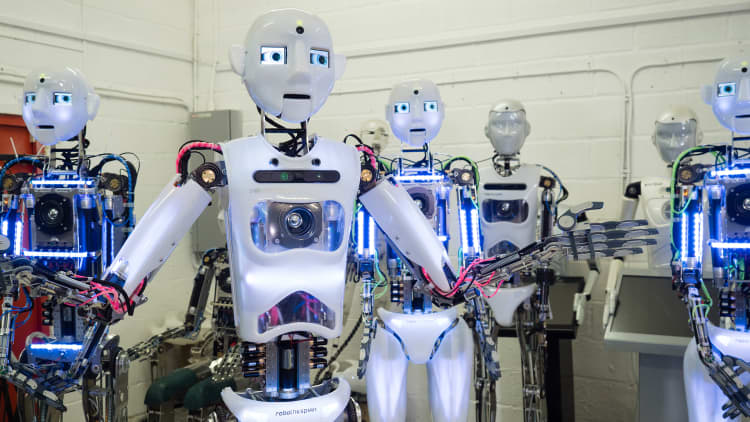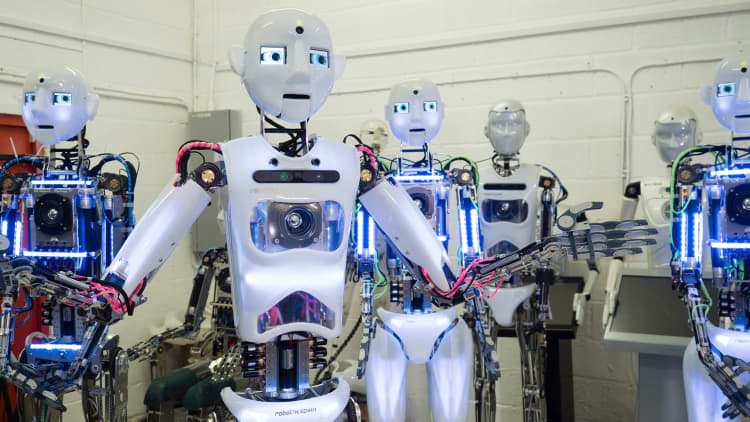They can track human movements, perform lifelike gestures, and even pull off a compelling rendition of "Singing in the Rain."
Called RoboThespian, the humanoid robots are designed and manufactured by U.K. company Engineered Arts.
But Will Jackson, founder and director of the robotics firm, said the robots won't be replacing his real-life employees anytime soon. Instead, he faces a different problem — he can't find enough skilled workers.
"We're always looking to hire new people," Jackson said. "One big problem we have is there's not much expertise in robotics, and there's huge demand."
Engineered Arts employs more than a dozen workers, from mechanics to motion developers. Based in Cornwall, southwest England, it designs and manufactures nearly every part of its robots in-house.

Its signature RoboThespian sells for around £60,000 ($83,000), mainly to visitor attractions and museums around the world. RoboThespian is programmed to sing and gesture to popular tunes from films, ranging from "The Sound of Music" to "The Lord of the Rings." It can also be customized for specific routines and conversations on stage.
"This is a case of robots making jobs, not robots taking jobs," Jackson said.
Engineered Arts is among a growing number of companies that are less worried about robots replacing jobs as they are about finding skilled workers in an increasingly automated economy. While research varies on how many jobs will be lost to robots, most experts agree the skills needed to operate in the future workforce are rapidly changing.
"Digital skills, IT skills, all the STEM (Science, Technology, Engineering, and Mathematics) skills are really very important for…the workers of the future," said Stefano Scabbio, president of Northern Europe, Mediterranean, and Eastern Europe at ManpowerGroup, a global staffing firm.
In a January survey of 20,000 employers from 42 countries, ManpowerGroup found 86 percent of companies plan to increase or maintain headcount in the next two years due to automation, with the biggest job gains in the IT, customer service and advanced manufacturing sectors.
But employers said they struggle to find talent with the right mix of skills, like problem solving, communication, organization and collaboration.
"It's important that we educate companies of every size to really understand the importance of re-skilling and skilling people," Scabbio said.
There's plenty of debate over just how many jobs will be lost to robots. A widely-cited study by two Oxford economists in 2013 found 47 percent of jobs in the U.S. were at risk of being automated over the next 20 years. Last year, McKinsey Global Institute, a think tank, estimated a similar 50 percent of activities in the global workforce are automatable.
Other experts point to history as proof that job losses from automation will be outweighed by the creation of new jobs. A 2017 report from the Information Technology and Innovation Foundation analyzed job growth in the locomotive and automobile industries at the turn of the 20th century. While railroad job growth slowed during the proliferation of the automobile, car mechanic and repairmen professions surged.
"Technology clearly creates jobs when it enables the creation of whole new industries and occupations," the study said.
Engineered Arts' Jackson agrees. He said he's always looking to employ workers who have an understanding of mechanics, electronics, software and design to bring his robots to life.
"You really need people that can span across all those different camps," he said.



